How to Use Lovable AI to Write Better Code Faster?
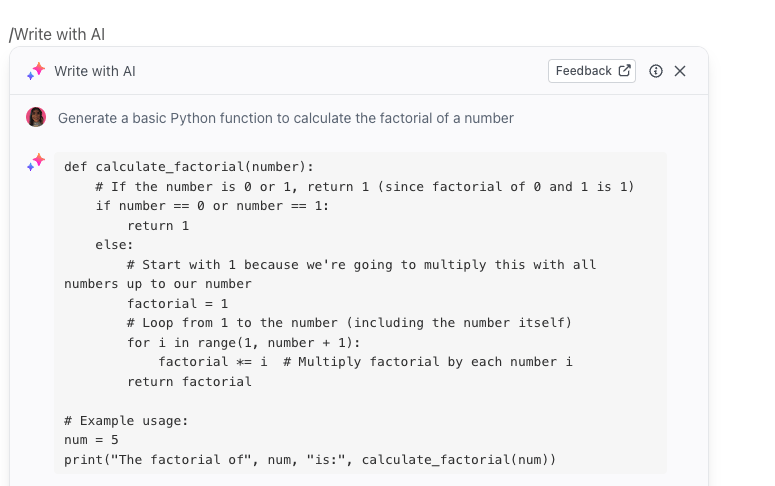
Sorry, there were no results found for “”
Sorry, there were no results found for “”
Sorry, there were no results found for “”

At the risk of sounding corny, is Lovable AI all that lovable?
Designed to help users build the initial version of their app in seconds, this AI-powered tool offers a fresh take on app development, boosting productivity and saving time for those knee-deep in technical tasks.
Still, many users are unclear on how to use Lovable AI, especially when they want to use user authentication or what the app creation process actually involves.
This guide breaks down exactly what Lovable AI offers, how to use it for your new project, and which AI-powered development tools it’s competing with in the market.
| Feature | Loveable AI | ⭐ The Best Alternative: ClickUp |
|---|---|---|
| Core purpose | Generates full-stack web apps instantly from natural language prompts; ideal for rapid prototyping | End-to-end product planning, execution, documentation, automation, and AI-powered assistance in one Converged AI Workspace |
| App & code generation | Creates entire web apps (frontend + backend) using a single prompt; edits UI and logic via text commands | Not a code generator — instead supports full product lifecycle with AI-built tasks, specs, plans, and stakeholder updates |
| Skill requirement | Requires some technical knowledge for debugging, API integration, and advanced customization | Beginner-friendly; no coding required for automations, workflows, docs, or planning |
| Knowledge & documentation | No built-in documentation ecosystem; relies on external tools and manual uploads | ClickUp Docs + Whiteboards + Connected AI Search centralize all product requirements, specs, decisions, and iterations |
| Workflow & task management | Not supported — focuses on app creation, not ongoing project execution | Deep task management (Lists, Kanban, Sprints, Calendars, Gantt) with AI catchups, priorities, dependencies, and automations |
| AI capabilities | Full-stack generation, UI edits, authentication setup, database creation, GitHub export | AI-generated sprints, roadmaps, summaries, docs, PRD updates, stakeholder reports — across tasks, chat, docs, and integrations |
| Version control | Exports code to GitHub for external editing and version control | Native GitHub integration to sync PRs, commits, branches with ClickUp tasks for real-time progress tracking |
| Collaboration | Limited — mostly prompt-based, single-user editing flow | Real-time editing, comments, tagging, chat, task linking, and collaborative docs for teams across product, engineering, and design |
| Visual design | Basic UI customization; outputs often resemble default Tailwind patterns | Advanced collaborative Whiteboards, customizable Docs, diagrams, charts, embedded tasks, and synced visual roadmaps |
| Scalability | Great for MVPs and solo builders; limited for complex long-term projects | Built for scaling teams and products — supports cross-department workflows, planning, reporting, and multi-team execution |
| Knowledge access | Must manually upload or describe assets; no unified search | ClickUp Brain provides instant knowledge retrieval across tasks, docs, chat, and integrated tools (Drive, GitHub, Slack, etc.) |
| Where it shines | Quick prototypes, concept validation, simple full-stack apps generated in minutes | Managing full product cycles — ideation → planning → execution → collaboration → reporting → iteration |
| Pricing efficiency | Usage-based credits; costs scale with prompts | Free forever; Customization available for enterprises |
Lovable AI is an AI-powered platform that lets you create fully functional web apps just by describing your idea in natural language.
The best part is that it writes the AI-generated code for you, so even if you have limited coding experience, you can build apps fast.
This AI coding tool also integrates with tools like Supabase and GitHub to simplify the development process, in addition to:
📖 Also Read: How to Become a Better Programmer
What sets Lovable AI apart is its ability to turn complex app development into a fast, flexible, and collaborative experience without sacrificing control or customization. However, to highlight its key features:
✅ Generate full-stack web apps with AI-generated code from a single natural language description, including both frontend and backend logic
✅ Connect to your GitHub repository for instant export, ensuring version control, seamless code management, and long-term ownership of your app
✅ Build apps that support user authentication, database relationships, and access control without needing to write the backend code manually
✅ Use a clean, text-first user interface that prioritizes quick iterations over drag-and-drop complexity, ideal for rapid prototyping and focused builds
✅ Deploy and share your app instantly with a shareable URL, making user engagement and feedback collection easy from the very first version
Let’s walk you through how to use Lovable AI, from creating your account to deploying a full-stack application with GitHub integration and visual elements.
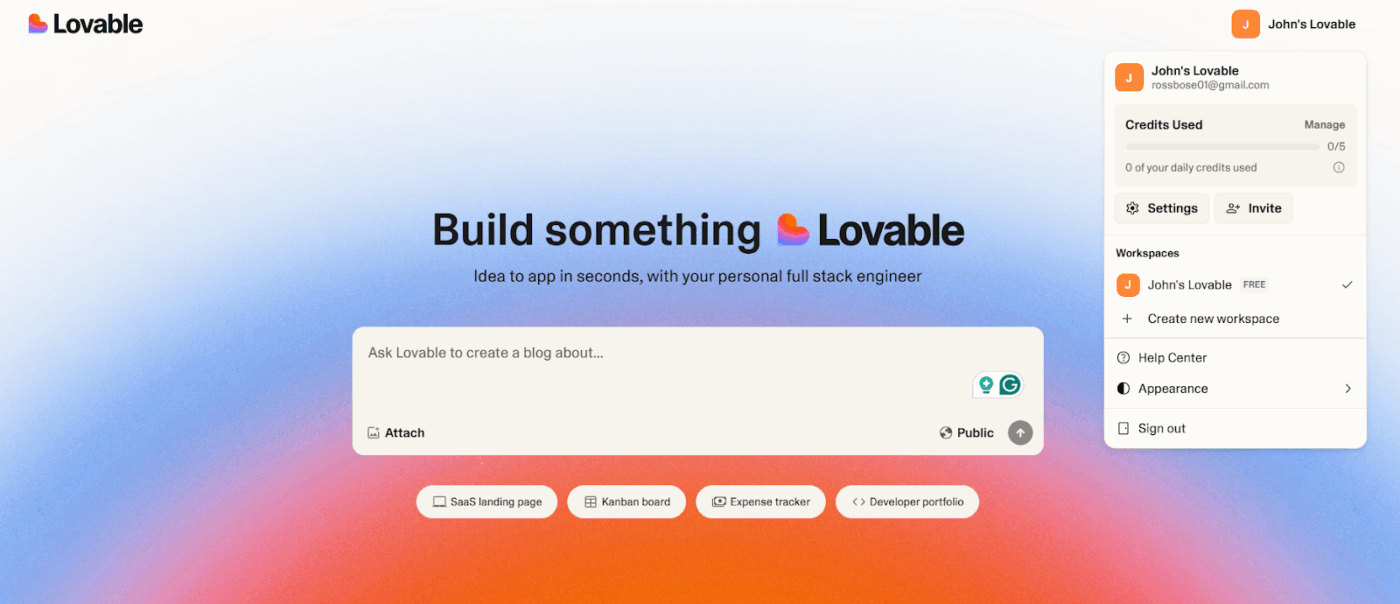
Go to the Lovable AI website and click on “Sign Up.” After registering, log in to your Lovable account. Your dashboard is now active—this is where all your projects will live.
💡 Pro Tip: Struggling to turn specs into shippable tasks faster? Unlocking the Power of ClickUp AI for Software Teams shows how AI-built prompts help your dev team cut the busywork and focus on building.
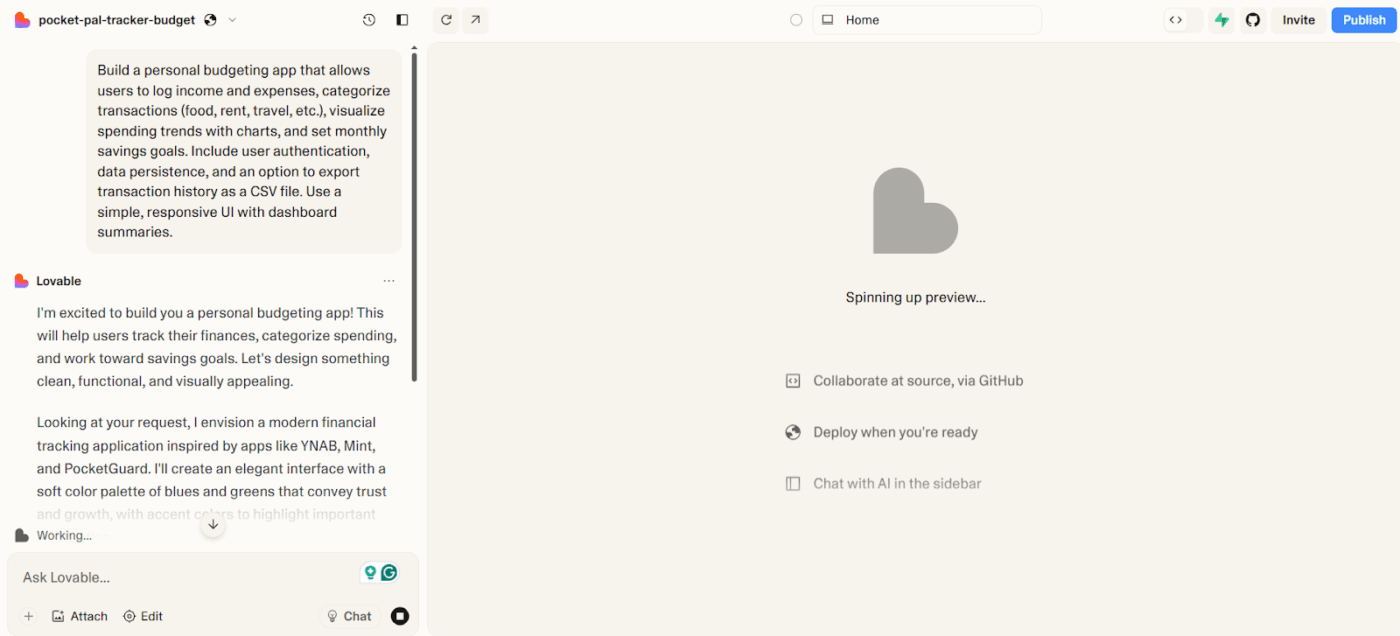
Click on the text input field and describe your app idea using a natural language description, including any necessary database tables. This initial prompt kicks off the app creation process, and Lovable AI will generate a functional prototype, complete with both UI and backend logic.
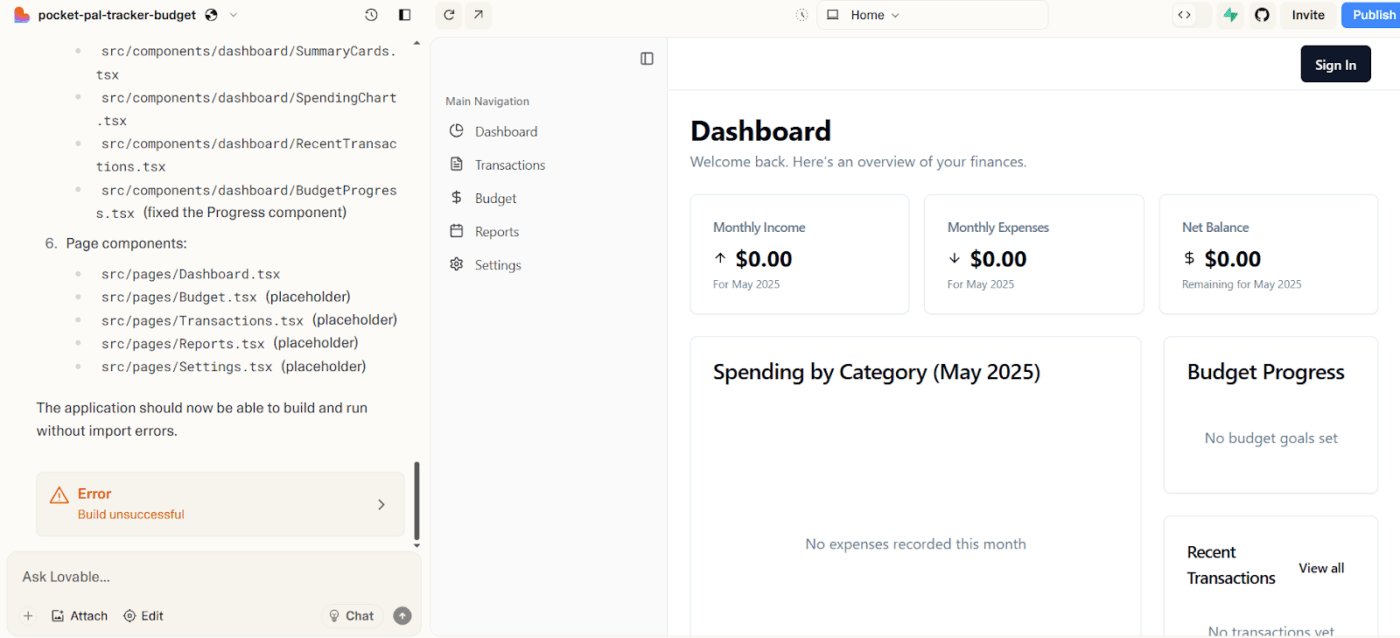
📖 Also Read: How to Launch a Product
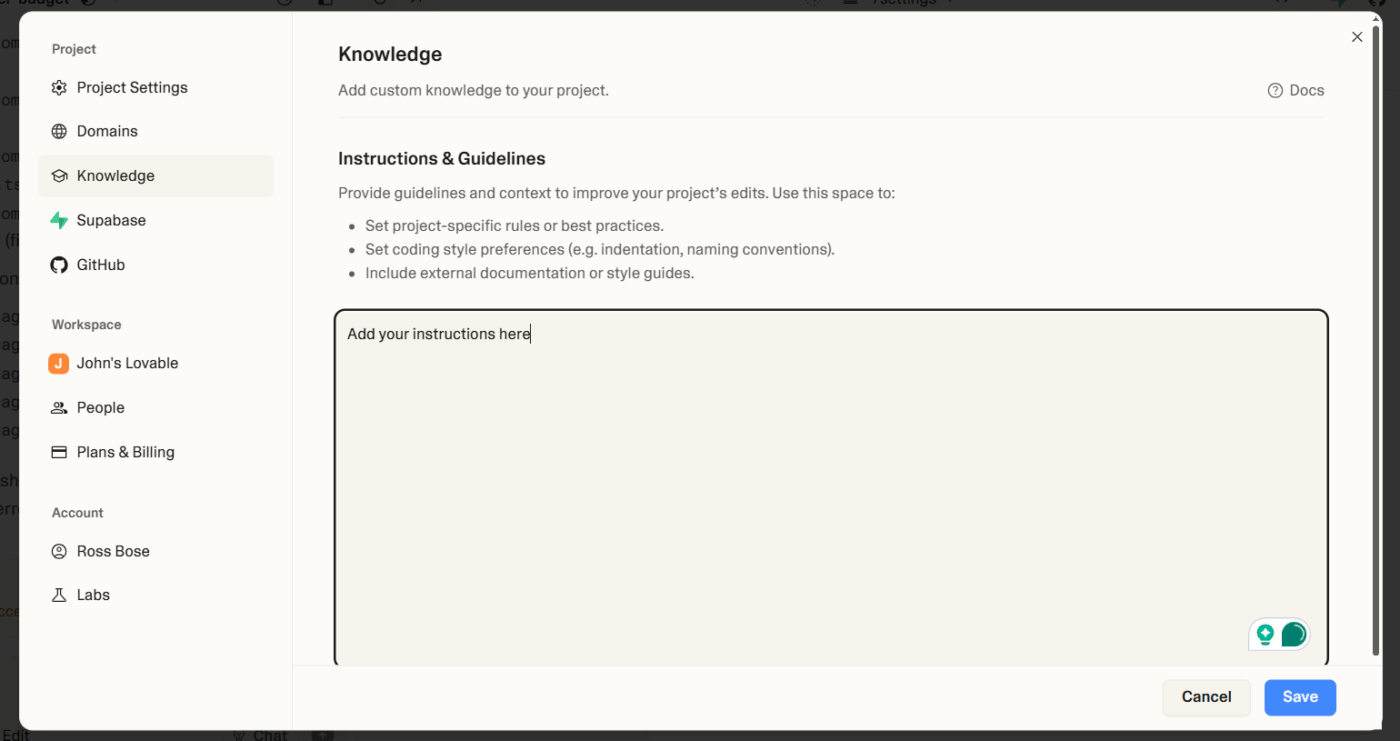
Use the Knowledge Base to guide your app development:
This step ensures your AI-powered builds stay aligned with your evolving vision.
👀 Fun Fact: The first computer “bug” was a literal moth stuck in a Harvard computer in 1947. Debugging has come a long way.
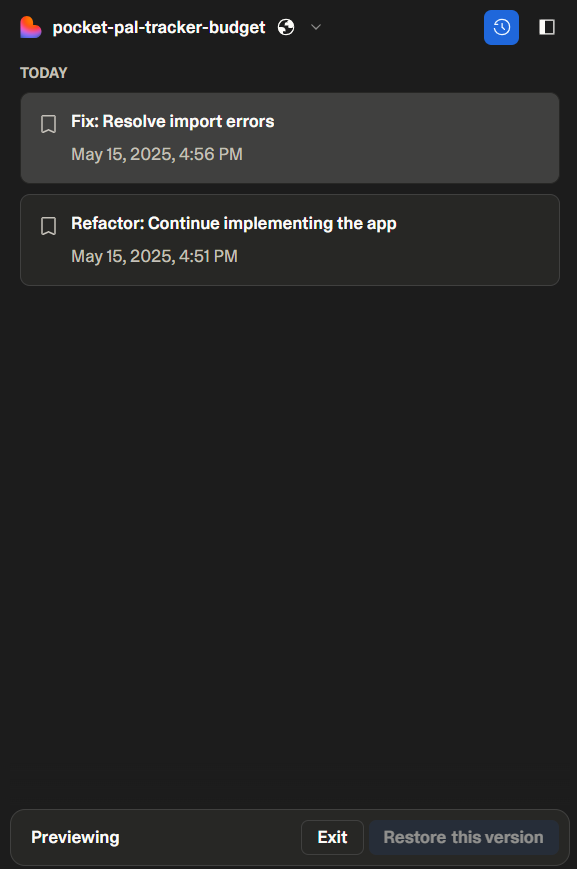
Once your app is built:
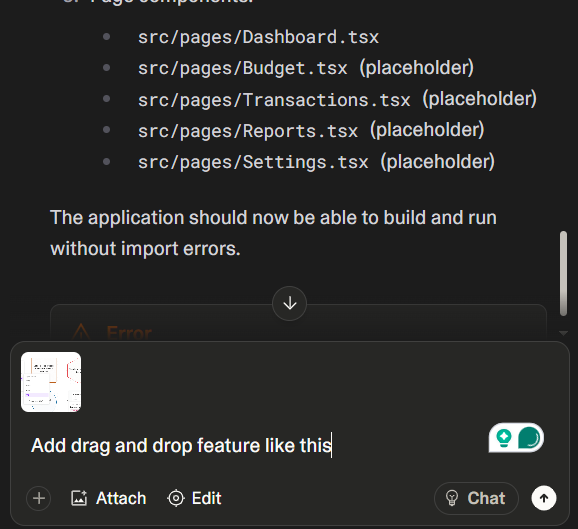
Improve context and user engagement by attaching visuals:
🧠 Did You Know: 41% of workers feel overwhelmed by heavy workloads. However, often, it’s not the work itself; it’s the lack of a clear system. Best Task Management Software Tools to Elevate Your Workflows helps you fix that by comparing 20 tools built to organize tasks, prevent burnout, and bring clarity to your team’s day-to-day.
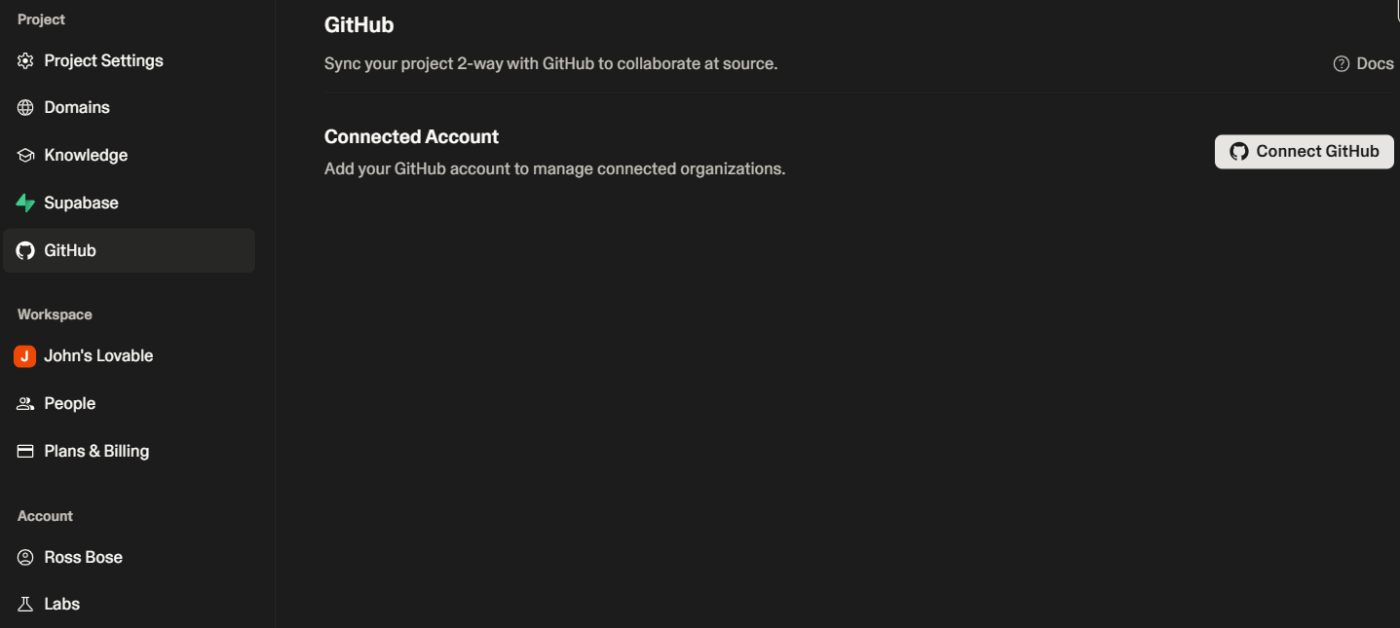
Set up GitHub integration for seamless code management and full access to the codebase:
📮 ClickUp Insight: Still relying on your to-do list? You’re not alone in using a to-do list, but it may not be as effective as you believe. While 76% of professionals have their own way of prioritizing tasks, studies show 65% often gravitate toward quick wins instead of high-impact work.
ClickUp’s Task Priorities help shift that. With AI-powered workflows and custom priority flags, you can instantly identify what matters most and maintain focus on work that truly makes a difference.
Want to make your app look better? Here are some easy ways to add images in Lovable AI and improve your design:
📖 Also Read: 9-Step Guide on How to Write Documentation for Code
I built a system in Lovable so fast I was floored by how easy it was to get the prototype working.
This Reddit user’s experience with Lovable AI basically captures why it is a fantastic productivity tool for developers.
Specifically, this AI model is excellent if the following is on your priority list:
You can go from a simple natural language description to a working functional app in minutes. It’s ideal for users who want to validate ideas quickly before committing to a full app development cycle.
💡 Pro Tip: Manual workflows slowing your releases? DevOps Automation: Benefits, Examples, and Best Practices shows how to speed up delivery by automating the right tasks—so your team ships faster, with less burnout.
For those with little or no coding experience, Lovable AI offers a way to build working products—including user authentication, database integration, and routing with paid plans—without writing backend logic manually.
Users appreciated the seamless integration with both Supabase and GitHub repositories, which makes it easier to manage authentication, sync code, and maintain version control in real time.
Unlike most AI tools, Lovable AI allows users to refine specific UI components with direct prompts. Want to tweak a single button’s behavior or spacing? Just select and instruct—it respects existing design logic.
For solo builders and early-stage startups, Lovable AI provides a fast track to a functional prototype. It’s particularly useful when no full design team is involved and you’re aiming for stakeholder feedback quickly.
💡 Pro Tip: Tired of chasing vague bug reports and wasting dev hours? Use the Free Bug Report Templates & Forms for Bug Tracking blog to standardize issue reporting, reduce back-and-forth, and keep your QA process clean and efficient.
There are a few areas where Lovable AI may fall short. This is particularly true for users expecting polished, production-ready output right away. These include:
📖 Also Read: Best Software Development Tools
One of the biggest drawbacks of Lovable AI is the manual effort required to upload every piece of information, be it images, data, or content, which raises several security concerns.
For teams who are rushing to meet deadlines, that overhead becomes counterproductive. ClickUp offers a more scalable approach, integrating all workstreams without the friction.
Imagine, instead of wasting time hunting for context, your team can ask direct questions and get answers instantly. ClickUp Brain transforms your workspace into a searchable knowledge engine—connecting tasks, docs, messages, and integrated apps like Google Drive or GitHub.
Here’s a quick video on ClickUp Brain, which scans through your ecosystem in seconds to answer any question you ask:
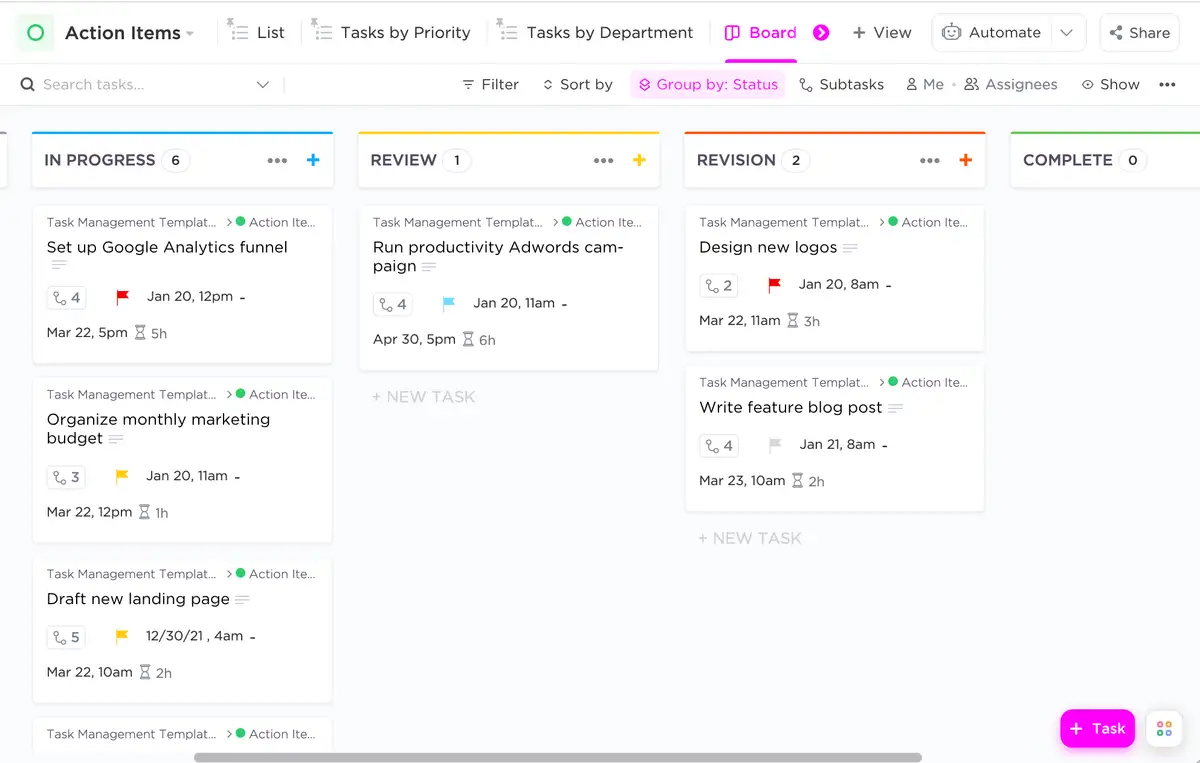
Unlike Lovable, which focuses on generating code per prompt rather than managing long-term workflows, ClickUp supports long-term planning with continuous updates.
Create iterative product plans, break them into tasks, and connect them directly to timelines, dependencies, and assignees. Product managers can link feature discussions to execution without repeating work across tools.
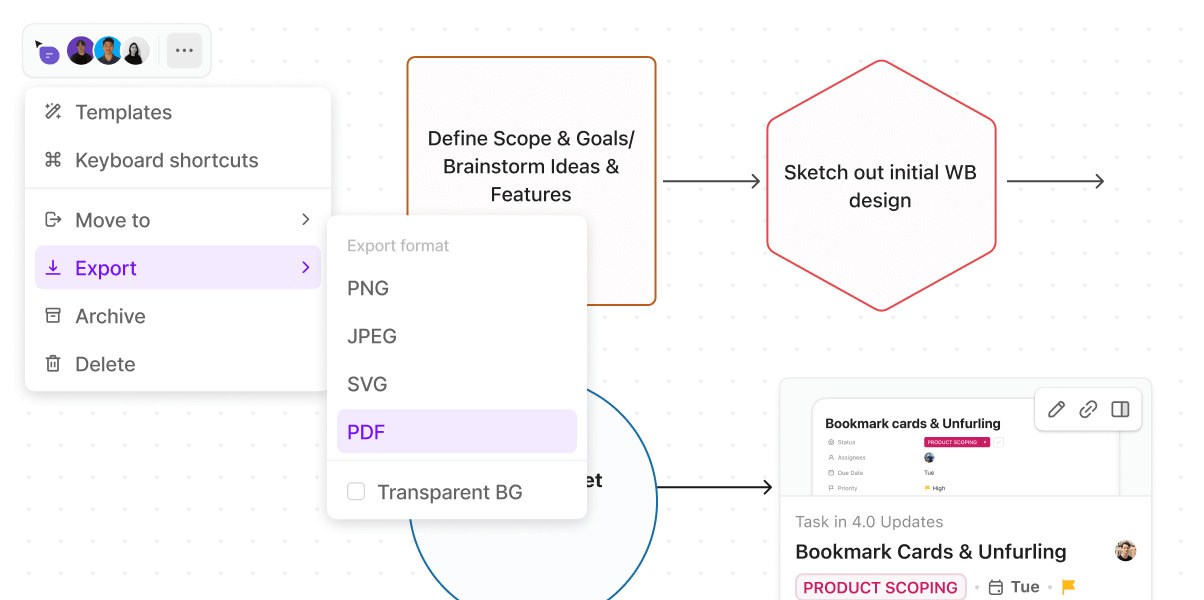
ClickUp Docs and ClickUp Whiteboards let teams collaboratively write product briefs, brainstorm features, and evolve specs over time.
You can embed tasks, link assets, or even trigger workflows from within a ClickUp Doc—something Lovable doesn’t support.
ClickUp Whiteboards are especially powerful for early ideation because they live side-by-side with actual work execution tools.
👀 Fun Fact: In 2022, DeepMind’s AlphaCode ranked in the top 54% of human coders on Codeforces just by interpreting problem patterns and writing functional code.
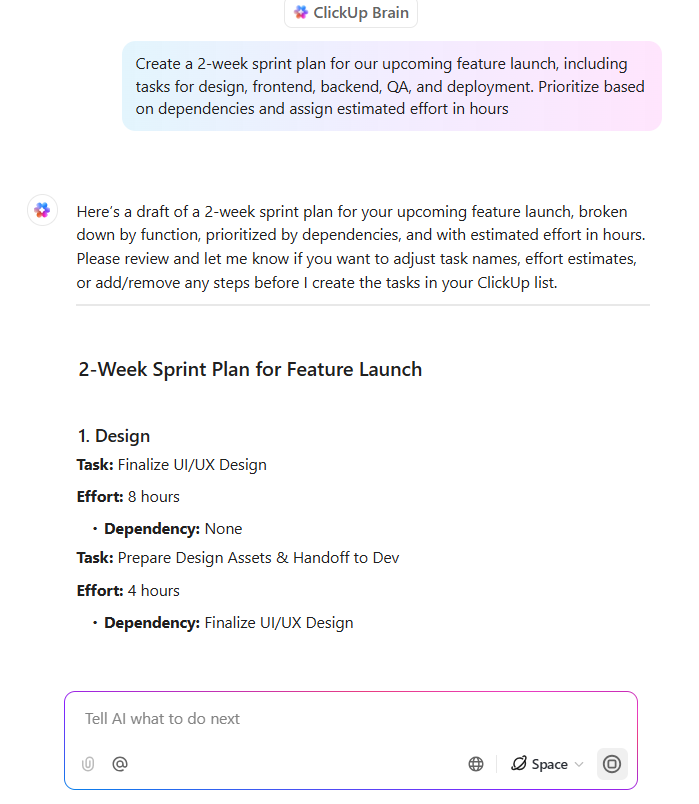
Unlike Lovable, which focuses on one app at a time, ClickUp orchestrates the full lifecycle.
With ClickUp Brain, you can auto-generate sprint plans, update stakeholders with one-click summaries, or turn meeting transcripts into actionable task lists. This means keeping roadmaps, docs, and updates aligned as your product evolves.
ClickUp Brain MAX turns your workspace into a connected knowledge engine. Ask questions about tasks, docs, specs, or code context and get instant, accurate answers. With Talk to Text, you can speak feature updates, sprint notes, or bug details and turn them into tasks or documentation in seconds. It keeps every detail in sync without breaking your flow.
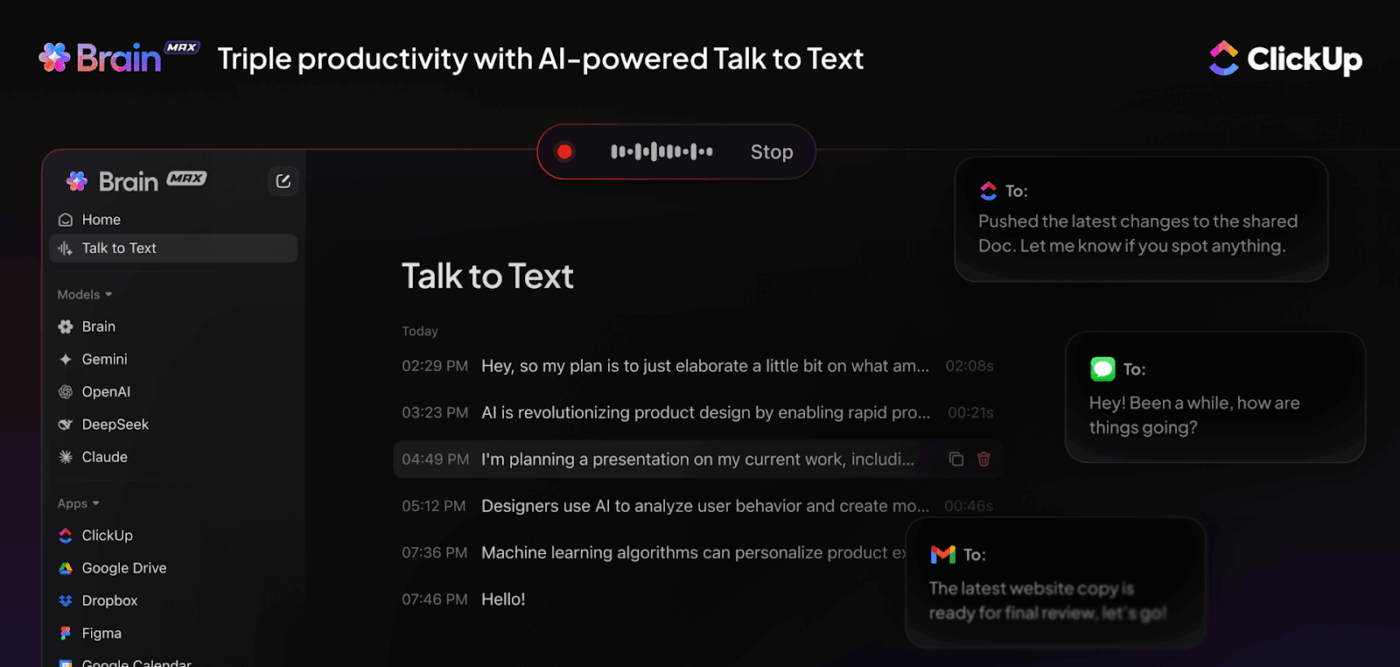
ClickUp Agents help you handle recurring dev tasks automatically. They can update fields, move tasks through stages, pull context from linked docs, and trigger next steps based on progress. No extra tools or prompts needed.
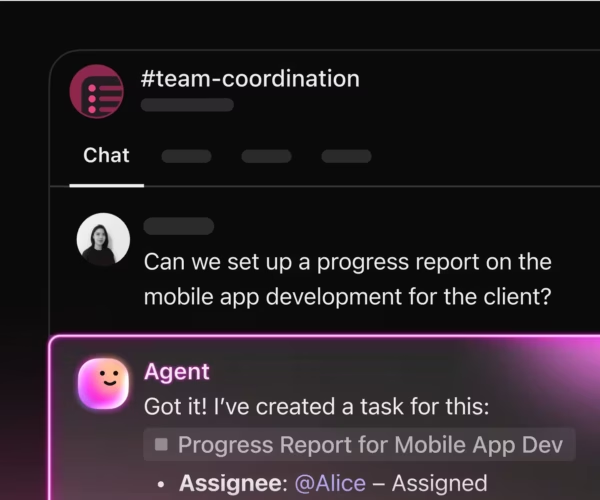
📖 Also Read: Development Workflow
See how ClickUp’s AI and automations help you build seamless workflows and save hours every week with no coding needed.
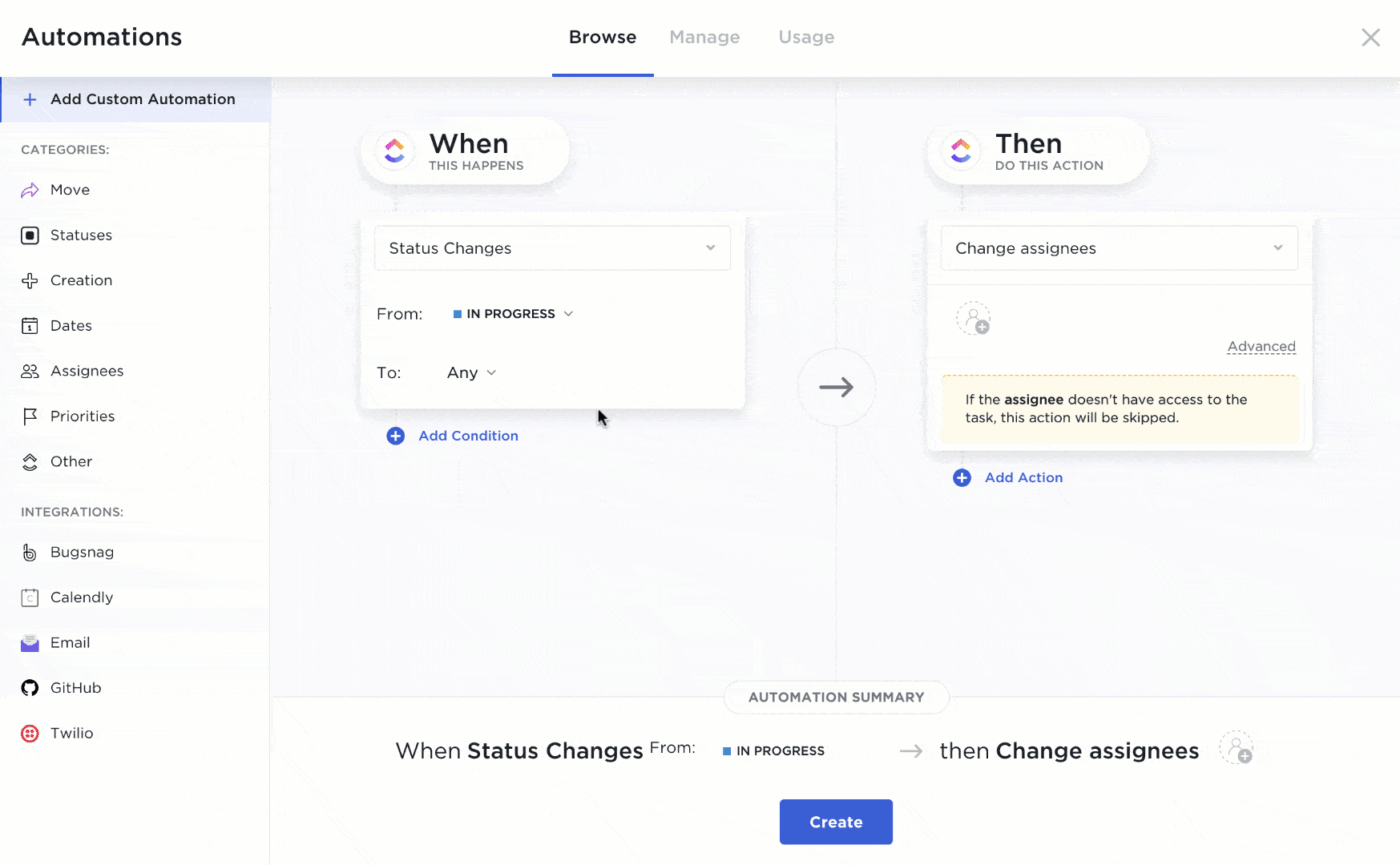
In Lovable AI, coordination still relies heavily on prompts and manual steps. However, ClickUp Automations enables you to configure automations that initiate updates immediately upon progress.
For instance, this occurs when a task transitions to “In Review” or when a sprint concludes. You can notify stakeholders, assign follow-up work, or update statuses automatically without writing a single line of code.
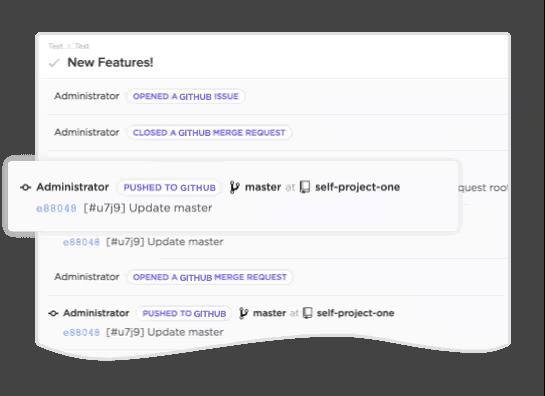
ClickUp integrates natively with GitHub so that commits, branches, and pull requests are linked to actual tasks, contrasting traditional development methods. Developers can update task statuses right from a commit message, and product teams can follow progress without leaving ClickUp.
This bridges the planning–engineering divide that Lovable AI often leaves disconnected.
🧠 Did You Know: Teams that use GitHub integrations see a 22% boost in productivity and onboard new devs 80% faster. Top 10 GitHub Integrations for Collaborative Code Development shows you which tools can help you work smarter, squash bugs faster, and scale collaboration effortlessly.
Both Lovable AI and ClickUp offer powerful features, but knowing when to use either is what unlocks true developer productivity.
If you want to spin up a working prototype quickly with minimal setup, Lovable AI excels at turning prompts into full-stack code. It’s useful for testing ideas, building MVPs, and creating quick mock apps.
ClickUp, on the other hand, is designed for scalability. It goes beyond prototyping to help teams organize, plan, execute, and iterate on product development. With tools like Docs, Whiteboards, Automations, and ClickUp Brain, it centralizes knowledge, enables real-time collaboration, and supports long-term growth across departments.
While Lovable AI shines when spinning up quick prototypes by simply describing them with minimal code, it often stumbles when projects demand scale, collaboration, and long-term planning.
It’s great for a one-and-done build but less reliable when iteration, refinement, and coordination come into play.
That’s where ClickUp brings clarity, consistency, and automation to every stage of work.
Whether you’re building products, collaborating across departments, or keeping clients in the loop, ClickUp makes it all manageable and scalable.
This isn’t just theory—users like Christian Gonzalez from the Cámara Nacional de Comercio have seen the impact firsthand, and his experience is a great example:
We simplify all the processes of our departments by integrating business intelligence platforms, mailing tools with automation, and storing KPIs, forms, process documents, and dependencies in one app (ClickUp). It is perfect for managing and monitoring different projects with dashboards and work with clients, inviting them as a guest.
Sign up on ClickUp and get your work done the smarter way.
At the risk of sounding corny, is Lovable AI all that lovable?
Designed to help users build the initial version of their app in seconds, this AI-powered tool offers a fresh take on app development, boosting productivity and saving time for those knee-deep in technical tasks.
Still, many users are unclear on how to use Lovable AI, especially when they want to use user authentication or what the app creation process actually involves.
This guide breaks down exactly what Lovable AI offers, how to use it for your new project, and which AI-powered development tools it’s competing with in the market.
| Feature | Loveable AI | ⭐ The Best Alternative: ClickUp |
|---|---|---|
| Core purpose | Generates full-stack web apps instantly from natural language prompts; ideal for rapid prototyping | End-to-end product planning, execution, documentation, automation, and AI-powered assistance in one Converged AI Workspace |
| App & code generation | Creates entire web apps (frontend + backend) using a single prompt; edits UI and logic via text commands | Not a code generator — instead supports full product lifecycle with AI-built tasks, specs, plans, and stakeholder updates |
| Skill requirement | Requires some technical knowledge for debugging, API integration, and advanced customization | Beginner-friendly; no coding required for automations, workflows, docs, or planning |
| Knowledge & documentation | No built-in documentation ecosystem; relies on external tools and manual uploads | ClickUp Docs + Whiteboards + Connected AI Search centralize all product requirements, specs, decisions, and iterations |
| Workflow & task management | Not supported — focuses on app creation, not ongoing project execution | Deep task management (Lists, Kanban, Sprints, Calendars, Gantt) with AI catchups, priorities, dependencies, and automations |
| AI capabilities | Full-stack generation, UI edits, authentication setup, database creation, GitHub export | AI-generated sprints, roadmaps, summaries, docs, PRD updates, stakeholder reports — across tasks, chat, docs, and integrations |
| Version control | Exports code to GitHub for external editing and version control | Native GitHub integration to sync PRs, commits, branches with ClickUp tasks for real-time progress tracking |
| Collaboration | Limited — mostly prompt-based, single-user editing flow | Real-time editing, comments, tagging, chat, task linking, and collaborative docs for teams across product, engineering, and design |
| Visual design | Basic UI customization; outputs often resemble default Tailwind patterns | Advanced collaborative Whiteboards, customizable Docs, diagrams, charts, embedded tasks, and synced visual roadmaps |
| Scalability | Great for MVPs and solo builders; limited for complex long-term projects | Built for scaling teams and products — supports cross-department workflows, planning, reporting, and multi-team execution |
| Knowledge access | Must manually upload or describe assets; no unified search | ClickUp Brain provides instant knowledge retrieval across tasks, docs, chat, and integrated tools (Drive, GitHub, Slack, etc.) |
| Where it shines | Quick prototypes, concept validation, simple full-stack apps generated in minutes | Managing full product cycles — ideation → planning → execution → collaboration → reporting → iteration |
| Pricing efficiency | Usage-based credits; costs scale with prompts | Free forever; Customization available for enterprises |
Lovable AI is an AI-powered platform that lets you create fully functional web apps just by describing your idea in natural language.
The best part is that it writes the AI-generated code for you, so even if you have limited coding experience, you can build apps fast.
This AI coding tool also integrates with tools like Supabase and GitHub to simplify the development process, in addition to:
📖 Also Read: How to Become a Better Programmer
What sets Lovable AI apart is its ability to turn complex app development into a fast, flexible, and collaborative experience without sacrificing control or customization. However, to highlight its key features:
✅ Generate full-stack web apps with AI-generated code from a single natural language description, including both frontend and backend logic
✅ Connect to your GitHub repository for instant export, ensuring version control, seamless code management, and long-term ownership of your app
✅ Build apps that support user authentication, database relationships, and access control without needing to write the backend code manually
✅ Use a clean, text-first user interface that prioritizes quick iterations over drag-and-drop complexity, ideal for rapid prototyping and focused builds
✅ Deploy and share your app instantly with a shareable URL, making user engagement and feedback collection easy from the very first version
Let’s walk you through how to use Lovable AI, from creating your account to deploying a full-stack application with GitHub integration and visual elements.

Go to the Lovable AI website and click on “Sign Up.” After registering, log in to your Lovable account. Your dashboard is now active—this is where all your projects will live.
💡 Pro Tip: Struggling to turn specs into shippable tasks faster? Unlocking the Power of ClickUp AI for Software Teams shows how AI-built prompts help your dev team cut the busywork and focus on building.

Click on the text input field and describe your app idea using a natural language description, including any necessary database tables. This initial prompt kicks off the app creation process, and Lovable AI will generate a functional prototype, complete with both UI and backend logic.

📖 Also Read: How to Launch a Product

Use the Knowledge Base to guide your app development:
This step ensures your AI-powered builds stay aligned with your evolving vision.
👀 Fun Fact: The first computer “bug” was a literal moth stuck in a Harvard computer in 1947. Debugging has come a long way.

Once your app is built:

Improve context and user engagement by attaching visuals:
🧠 Did You Know: 41% of workers feel overwhelmed by heavy workloads. However, often, it’s not the work itself; it’s the lack of a clear system. Best Task Management Software Tools to Elevate Your Workflows helps you fix that by comparing 20 tools built to organize tasks, prevent burnout, and bring clarity to your team’s day-to-day.

Set up GitHub integration for seamless code management and full access to the codebase:
📮 ClickUp Insight: Still relying on your to-do list? You’re not alone in using a to-do list, but it may not be as effective as you believe. While 76% of professionals have their own way of prioritizing tasks, studies show 65% often gravitate toward quick wins instead of high-impact work.
ClickUp’s Task Priorities help shift that. With AI-powered workflows and custom priority flags, you can instantly identify what matters most and maintain focus on work that truly makes a difference.
Want to make your app look better? Here are some easy ways to add images in Lovable AI and improve your design:
📖 Also Read: 9-Step Guide on How to Write Documentation for Code
I built a system in Lovable so fast I was floored by how easy it was to get the prototype working.
This Reddit user’s experience with Lovable AI basically captures why it is a fantastic productivity tool for developers.
Specifically, this AI model is excellent if the following is on your priority list:
You can go from a simple natural language description to a working functional app in minutes. It’s ideal for users who want to validate ideas quickly before committing to a full app development cycle.
💡 Pro Tip: Manual workflows slowing your releases? DevOps Automation: Benefits, Examples, and Best Practices shows how to speed up delivery by automating the right tasks—so your team ships faster, with less burnout.
For those with little or no coding experience, Lovable AI offers a way to build working products—including user authentication, database integration, and routing with paid plans—without writing backend logic manually.
Users appreciated the seamless integration with both Supabase and GitHub repositories, which makes it easier to manage authentication, sync code, and maintain version control in real time.
Unlike most AI tools, Lovable AI allows users to refine specific UI components with direct prompts. Want to tweak a single button’s behavior or spacing? Just select and instruct—it respects existing design logic.
For solo builders and early-stage startups, Lovable AI provides a fast track to a functional prototype. It’s particularly useful when no full design team is involved and you’re aiming for stakeholder feedback quickly.
💡 Pro Tip: Tired of chasing vague bug reports and wasting dev hours? Use the Free Bug Report Templates & Forms for Bug Tracking blog to standardize issue reporting, reduce back-and-forth, and keep your QA process clean and efficient.
There are a few areas where Lovable AI may fall short. This is particularly true for users expecting polished, production-ready output right away. These include:
📖 Also Read: Best Software Development Tools
One of the biggest drawbacks of Lovable AI is the manual effort required to upload every piece of information, be it images, data, or content, which raises several security concerns.
For teams who are rushing to meet deadlines, that overhead becomes counterproductive. ClickUp offers a more scalable approach, integrating all workstreams without the friction.
Imagine, instead of wasting time hunting for context, your team can ask direct questions and get answers instantly. ClickUp Brain transforms your workspace into a searchable knowledge engine—connecting tasks, docs, messages, and integrated apps like Google Drive or GitHub.
Here’s a quick video on ClickUp Brain, which scans through your ecosystem in seconds to answer any question you ask:

Unlike Lovable, which focuses on generating code per prompt rather than managing long-term workflows, ClickUp supports long-term planning with continuous updates.
Create iterative product plans, break them into tasks, and connect them directly to timelines, dependencies, and assignees. Product managers can link feature discussions to execution without repeating work across tools.

ClickUp Docs and ClickUp Whiteboards let teams collaboratively write product briefs, brainstorm features, and evolve specs over time.
You can embed tasks, link assets, or even trigger workflows from within a ClickUp Doc—something Lovable doesn’t support.
ClickUp Whiteboards are especially powerful for early ideation because they live side-by-side with actual work execution tools.
👀 Fun Fact: In 2022, DeepMind’s AlphaCode ranked in the top 54% of human coders on Codeforces just by interpreting problem patterns and writing functional code.

Unlike Lovable, which focuses on one app at a time, ClickUp orchestrates the full lifecycle.
With ClickUp Brain, you can auto-generate sprint plans, update stakeholders with one-click summaries, or turn meeting transcripts into actionable task lists. This means keeping roadmaps, docs, and updates aligned as your product evolves.
ClickUp Brain MAX turns your workspace into a connected knowledge engine. Ask questions about tasks, docs, specs, or code context and get instant, accurate answers. With Talk to Text, you can speak feature updates, sprint notes, or bug details and turn them into tasks or documentation in seconds. It keeps every detail in sync without breaking your flow.

ClickUp Agents help you handle recurring dev tasks automatically. They can update fields, move tasks through stages, pull context from linked docs, and trigger next steps based on progress. No extra tools or prompts needed.

📖 Also Read: Development Workflow
See how ClickUp’s AI and automations help you build seamless workflows and save hours every week with no coding needed.

In Lovable AI, coordination still relies heavily on prompts and manual steps. However, ClickUp Automations enables you to configure automations that initiate updates immediately upon progress.
For instance, this occurs when a task transitions to “In Review” or when a sprint concludes. You can notify stakeholders, assign follow-up work, or update statuses automatically without writing a single line of code.

ClickUp integrates natively with GitHub so that commits, branches, and pull requests are linked to actual tasks, contrasting traditional development methods. Developers can update task statuses right from a commit message, and product teams can follow progress without leaving ClickUp.
This bridges the planning–engineering divide that Lovable AI often leaves disconnected.
🧠 Did You Know: Teams that use GitHub integrations see a 22% boost in productivity and onboard new devs 80% faster. Top 10 GitHub Integrations for Collaborative Code Development shows you which tools can help you work smarter, squash bugs faster, and scale collaboration effortlessly.
Both Lovable AI and ClickUp offer powerful features, but knowing when to use either is what unlocks true developer productivity.
If you want to spin up a working prototype quickly with minimal setup, Lovable AI excels at turning prompts into full-stack code. It’s useful for testing ideas, building MVPs, and creating quick mock apps.
ClickUp, on the other hand, is designed for scalability. It goes beyond prototyping to help teams organize, plan, execute, and iterate on product development. With tools like Docs, Whiteboards, Automations, and ClickUp Brain, it centralizes knowledge, enables real-time collaboration, and supports long-term growth across departments.
While Lovable AI shines when spinning up quick prototypes by simply describing them with minimal code, it often stumbles when projects demand scale, collaboration, and long-term planning.
It’s great for a one-and-done build but less reliable when iteration, refinement, and coordination come into play.
That’s where ClickUp brings clarity, consistency, and automation to every stage of work.
Whether you’re building products, collaborating across departments, or keeping clients in the loop, ClickUp makes it all manageable and scalable.
This isn’t just theory—users like Christian Gonzalez from the Cámara Nacional de Comercio have seen the impact firsthand, and his experience is a great example:
We simplify all the processes of our departments by integrating business intelligence platforms, mailing tools with automation, and storing KPIs, forms, process documents, and dependencies in one app (ClickUp). It is perfect for managing and monitoring different projects with dashboards and work with clients, inviting them as a guest.
Sign up on ClickUp and get your work done the smarter way.
© 2026 ClickUp